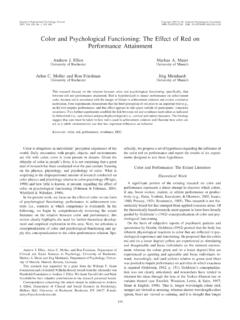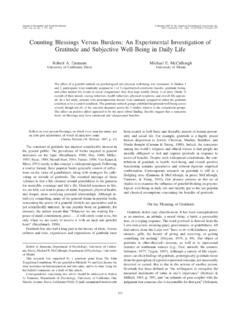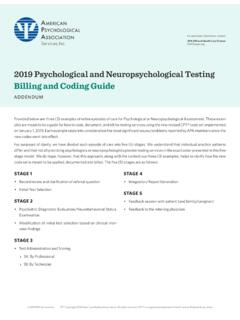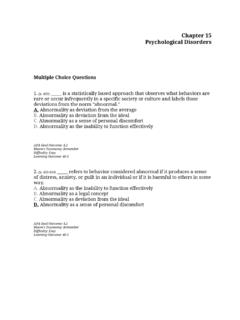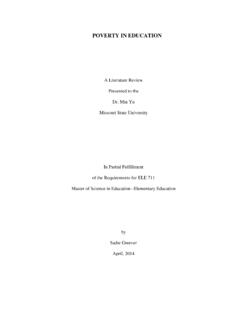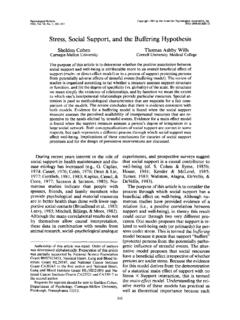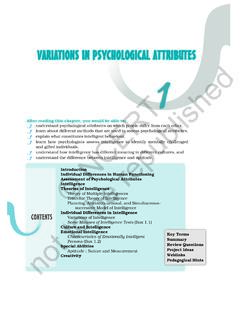Transcription of The Effect of Classical Music on Anxiety and Well-Being of ...
1 International Education Studies; Vol. 12, No. 11; 2019 ISSN 1913-9020 E-ISSN 1913-9039 Published by Canadian Center of Science and Education 18 The Effect of Classical Music on Anxiety and Well-Being of University Students Devrim ERGINSOY OSMANO LU1 & H seyin YILMAZ2 1 Department of Educational Sciences, Faculty of Education, Kafkas University, Kars, Turkey 2 Department of Fine Arts Education, Faculty of Education, Kafkas University, Kars, Turkey Correspondence: Devrim ERGINSOY OSMANO LU, Department of Educational Sciences, Faculty of Education, Kafkas University, Kars, Turkey. Received: July 26, 2019 Accepted: August 28, 2019 Online Published: October 12, 2019 URL: Abstract psychological and spiritual effects of Music on people have been revealed by various studies and still continue to be investigated.
2 The sound which has existed since the first formation of the universe; and Music and Music therapy which are as old as the history of mankind have constituted one of the treatment methods widely investigated at hospitals and universities. In the daily lives of people, Anxiety , stress, Well-Being and similar phenomena clearly remain in the foreground. The current study is an experimental study designed to determine the Effect of listening to Classical Music on Anxiety and Well-Being . The sampling of the study is comprised of senior students in an education faculty. A total of 15 students (7 females and 8 males) participated in the current study. The data were collected with the State-Trait Anxiety Scale and the psychological Well-Being Scale.
3 In the analysis of the data, Paired Sample t-Test was used. The findings of the current study have revealed that while listening to Classical Music for a 60-day period (listening to Classical Music ever day according to a Music listening schedule) did not have any significant Effect on the students State Anxiety scores, it led to a statistically significant Effect on their Trait Anxiety and psychological Well-Being scores (t=3,451 P<0,004; t= , P< ). When the pre-test and post-test psychological Well-Being mean scores were compared, no significant difference was found for the sub-dimension of autonomy , significant differences in favour of post-test scores were found for the sub-dimensions of positive relations with others , environmental mastery , personal growth , purpose in life , and self-acceptance.
4 Keywords: Music , psychological Well-Being , state and trait Anxiety 1. Introduction From the moment of birth, every person encounters a lot of information from many sources such as culture and social environment. This information is interpreted by a psychic system. These interpretations can lead to positive as well as negative emotions such as Anxiety (Manester, Berra, & Mays, 2001; Drescher, 2007). Anxiety and Anxiety -relieving strategies play an important role in the work of many psychoanalytic theorists because researchers agree that Anxiety is an unpleasant emotional experience. Anxiety is a state of extreme concern and fear that a person experiences when he/she encounters a stimulus from the outside or inner world and individual has difficulty in preventing negative physical, emotional and mental reactions (Budak, 2009, p.)
5 418; zg l, 2003). Freud studied Anxiety for many years and argued that this negative feeling was a force resulting from the suppression of impulses and instincts. According to Freud, the function of the concept of Anxiety is to stimulate one s defence mechanism and self against any danger (Burger, 2015; zt rk & Ulu ahin, 2015; I k n, 2018, p. 5). There are two types of Anxiety ; trait Anxiety and state Anxiety . State Anxiety is a state of unease and unhappiness that arises as a result of a temporary situation experienced by the individual but disappears as soon as the threat disappears. The state of which the individual is afraid is evident. In the case of state Anxiety , when the person experiences intense fear, physiological reactions such as sweating, fading, flushing and trembling occur in the body.
6 When the threat disappears, Anxiety level decreases. This situation is not considered a problem and is necessary for survival in threat situations. The type of Anxiety that affects mental health negatively is continuous Anxiety . Trait Anxiety on the other hand refers to the individual s disposition to experience Anxiety . The individual perceives the situations in which he/she is as stressful and tends to interpret events negatively (Kayap nar, 2006; International Education Studies Vol. 12, No. 11; 2019 19 T rk apar, 2012; Aynac , 2018). Individuals with high level of trait Anxiety can generally feel uneasiness and unhappiness ( ner & Le Compte, 1983).
7 Long-term Anxiety affects negatively the individual s sense of satisfaction about life. Diener (1994) argued that the most important element in the formation of an individual s sense of satisfaction with life is his or her perception of the world. (Deiner, 2000). According to Diener, the presence of positive emotions is frequent, negative emotions are less and life satisfaction is high, indicating good life or happiness (subjective Well-Being ) (Proctor, 2014). According to Diener, the presence of positive affections is frequent, negative affections are less, and a high sense of satisfaction with life is indicative of good life or happiness (subjective Well-Being ) (Proctor, 2014).When positive feelings are frequent and intense and negative feelings are relatively low and when activities in life provide satisfaction, subjective Well-Being of individuals increases.
8 This suggests that Anxiety may have a significant relationship with subjective Well-Being ( zt rk & etinkaya, 2015). Subjective Well-Being has two components: emotional and cognitive. According to Myers and Deiner (1995), besides these two components there is a third component called life satisfaction (Cited in zen, 2010). In the positive affective dimension of subjective Well-Being , emotions such as joy, excitement, pride, hope, interest, alertness and trust are found while in its negative affective dimension, feelings such as sadness, guilt, hate, Anxiety and anger are found. In the third dimension which is called life satisfaction, the individual s sense of satisfaction and evaluations about various living spaces are found.
9 In order to say that an individual s level of subjective Well-Being is high, his/her life satisfaction should be high and experience positive feelings frequently yet negative feelings occasionally (Ery lmaz, 2010). The World Health Organization (WHO) has defined positive mental health as a state of Well-Being in which the individual is aware of his or her abilities, can cope with the stress of daily life, work productively and contribute to society (Huppert, 2009). The state of Well-Being has always existed psychologically in human life. According to Huppert (2009), psychological Well-Being is a combination of having a good life and feeling well and functioning effectively. Sustainable Well-Being does not require individuals to always feel good; experiencing painful emotions ( frustration, failure, and sadness) is a normal part of life; being able to struggle with these negative and painful emotions is essential for long-term Well-Being .
10 However, when negative emotions such as Anxiety are severe or prolonged, the psychological Well-Being interferes negatively with an individual s ability to maintain daily life with positive emotions (Cited in G et-Tekin, 2014, pp. 9-12). For this reason, various treatment and therapy methods are used to minimize these negative emotions and increase the feeling of satisfaction with life. Music believed to have a mystical power since ancient Greek has been reported to lead to emotional changes, relieve and reduce stress by many studies (Juslin & Sloboda, 2010). In the history of Islamic civilization, especially Sufis who have been interested in Sufism have used Music and argued that it has a psychological Effect . Sufis mentioned that mental and neurological diseases have been treated with Music ( oban, 2005, p.)










